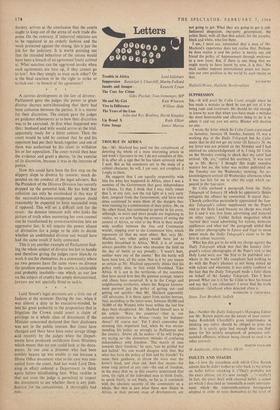Ilh em Letters Trouble in Africa Lord Salisbury Suppression Randolph S.
Churchill, Martin Folkard Insults and Images , Kenneth Tynan The Cure for Crime
Giles Play fair, Tom Iremonger, MP
Me and My Girl Kate Wharton Vive la Difference' William Hale
The Years of the Lion John and Roy Bout:Mg. David Kingsley
Up Brand X Ruth Elliott False Image James Marcus
TROUBLE IN AFRICA
Sin,--Mr. Macleod has paid me the compliment of devoting the whole of a most interesting article in last week's Spectator to me. I do not complain of this. It is, after all, a sign that he has taken seriously what I said But as his comments are in the main of a critical character, he will, I am sure, not complain if 1 reply to them.
He suggests that I am equally responsible with him for what has happened in Africa, since I was a member of the Government that gave independence to Ghana. To that, I think that I may fairly retort that I, at any rate, saw the red light at a very early date, resigned from the Government, and have ever since continued to warn them Of the dangers they were running by a continuation of their policy. He, on the other hand, has continued to persist in his error, although, as more and more people are beginning to realise, we are now facing the prospect of seeing the control of Africa, so vital to the West in their world- wide conflict between the free and Communist worlds, slipping over to the Communist bloc, which represents all that we most abhor. But, says Mr. Macleod, 'any other policy would have led to terrible bloodshed In Africa.' Well, it is of course always possible for those who abandon the field on the day of battle to say proudly: 'I wasn't hurt, neither were any of the enemy.' But the battle will have been lost, all the same. Nor is it by any means as certain as 'Mr. Macleod apparently thinks that his policy really does in fact avoid bloodshed. Take Africa. It is not in the territories of the countries that have stood firm that the greatest carnage, misery and chaos have occurred. It is in the Congo and neighbouring territories, where the Belgian Govern- ment pursued just the policy of getting out—and getting out quickly—that Mr. Macleod apparently still advocates. It is there, apart from earlier horrors, that, according to the latest news, between 20,000 and 30,000 of the Watutsi tribe have within the last few days been slaughtered. Mr. Macleod himself says in his article: 'Were the countries'—that is, our colonial territories in Africa—'ready for Indepen- dence? Of course not.' Yet I don't remember his stressing this important fact, when he was recom- mending his' policy so strongly to PaHiament and the country. AbOve all, he makes—if he will forgive my saying so—the elementary mistake of confusing independence with freedom. 'The march of men towards their freedom,' he says, 'can be guided but not halted.' No one would disagree with that. But what has been the policy of him and his friends? To cease their guidance, to throw the reins over the horse's head, and clear out. And that means—for some long period at any rate—the end of freedom, in the sense that we in this country understand that term, the right of the individual man to think freely, to speak freely, to act freely, so far as is consistent with the absolute security of the community as a whole. But that is just what these new States in Africa, at their present stage of development,- are not going to get. What they are going to get is old- fashioned despotism, one-party government, the police State, with all that that entails for the peoples, black and white, who live there.
I am, I must say, astonished that a man of Mr. Macleod's experience does not realise that. Perhaps he does realise it and his policy is merely our old friend the policy of Appeasement through weakness in a new form. But, if there is one thing that we ought surely to have learnt by now, it is this : We shall neither buttress international peace nor main- tain our own position in the world by such means as that.
SALISBURY






































 Previous page
Previous page